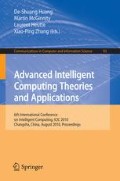Abstract
In this paper, a new hybrid Good Point set algorithm is applied to solve the constrained problems. PSO frame can make the resulting evolutionary algorithm more robust and statically sound, especially for global optimization. Good Points Set, a concept in number theory, can make the local search achieve the same sound results just as the state-of-the-art methods do, such as orthogonal method. But the precision of the algorithm is not confined by the dimension of the space. An integrated mechanism is used to enrich the exploration and exploitation abilities of the approach proposed. Experiment results on a set of benchmark problems show the efficiency of the algorithm.
Access this chapter
Tax calculation will be finalised at checkout
Purchases are for personal use only
Preview
Unable to display preview. Download preview PDF.
References
Van den Bergh, F., Engelbrecht, A.P.: A Cooperative Approach to Particle Swarm Optimization. IEEE Transactions on Evolutionary Computation 8, 225–239 (2004)
Leung, Y.W., Wang, Y.: An Orthogonal Genetic Algorithm with Quantization for Global Numerical Optimization. IEEE Trans. on Evolution Computation 5, 41–53 (2001)
Zhang, L., Zhang, B.: Good Point Set Based Genetic Algorithm. Chinese J. Computers 24, 917–922 (2001)
Xiao, C.X., Cai, Z.X., Wang, Y.: A Good Nodes Set Evolution Strategy for Constrained Optimization. In: IEEE Congress of Evolutionary Computation, Singapore, pp. 943–950 (2007)
Shi, Y., Eberhart, R.C.: A Modified Particle Swarm Optimizer. In: Proc. IEEE Conf. Evol. Comput., Anchorage, AK, pp. 69–73 (1998)
Mezura-Montes, E., Coello, C.A.: A Simple Multimembered Evolution Strategy to Solve Constrained Optimization Problems. IEEE Trans. Evol. Comput. 9, 1–17 (2005)
Farmani, R., Wright, J.A.: Self-Adaptive Fitness Formulation for Constrained Optimization. IEEE Trans.on Evolution Computation 7, 445–455 (2003)
Venkatraman, S., Yen, G.G.: A Generic Framework for Constrained Optimization Using Genetic Algorithms. IEEE Trans. on Evolution Computation 9, 424–435 (2005)
Author information
Authors and Affiliations
Editor information
Editors and Affiliations
Rights and permissions
Copyright information
© 2010 Springer-Verlag Berlin Heidelberg
About this paper
Cite this paper
Liu, Y., Li, S. (2010). Hybrid Good Point Set Evolutionary Strategy for Constrained Optimization. In: Huang, DS., McGinnity, M., Heutte, L., Zhang, XP. (eds) Advanced Intelligent Computing Theories and Applications. ICIC 2010. Communications in Computer and Information Science, vol 93. Springer, Berlin, Heidelberg. https://doi.org/10.1007/978-3-642-14831-6_5
Download citation
DOI: https://doi.org/10.1007/978-3-642-14831-6_5
Publisher Name: Springer, Berlin, Heidelberg
Print ISBN: 978-3-642-14830-9
Online ISBN: 978-3-642-14831-6
eBook Packages: Computer ScienceComputer Science (R0)

